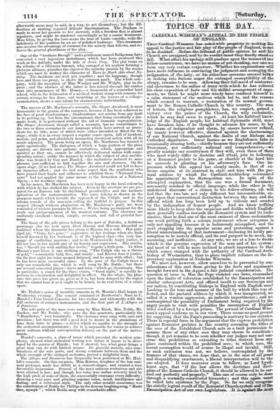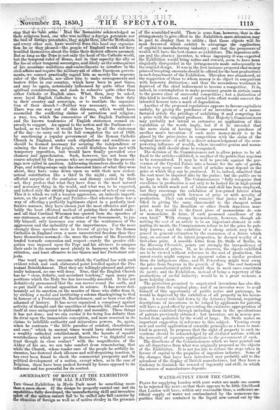TOPIC'S 0,1 1 TEE tAY.
CARDINAL WISEMAN'S .A.PRF: Ad-. 20 MEE PEOPLE OF RN-GLAND.
THAT. Cardinal Wiseman has laottedlwith ,prapciety in -making his ',weal to the justice and -fair play of flae -people of England, is-not ilea* doubted. .Before•the tribinuil of .publicupinion he and his Church are arraignediand,by its verdret.must,theyfmally stand ler fall. Whateffecthisnpology.willproduee upon them:lasses:of ozu• ;fellow-countrymen, we Isavetnoaneansuf yet denirling, .nor .oan'we form any very -certain conjecture. 'Whether his,explanations will have. more indueneein nonvineiug the judgment-and assuaging the .indignation-of the laity, or his aelentless sarcasms succeed "better in lashing into furious -anger the ;outraged, susceptibility ,of the alPrey, remains ,to be seen. Allowing their fallmeed of controver- sial ekvernass to the sallies of irony with which he has :relieved his.clear exposition -of facts and 'his skilful arrangement of .argu- ments, 'we think he might more -wisely-have confined himself to -a 'calm statement of the 'motives which led to, and the reasons which seemed to warrant, 'a -restoration of its 'normal govern- ment to the Roman-Catholic Char& in this country. The man of letters, the religious ,pamphleteer, "has, we suspect, gained a victory over the prince of the Church, the wily ecclesiastic, which he -may find cause to regret. At least "his.habitual know- ledge of the .F..tuglish people, his habitual diplomatic skill, must have forsaken him, if he thought to _advance his cause, to lay the storm of indignation and alarm, bar.sneers however refined, by taunts however effective -directed against the shorteoraings of our National fChurch, against the faults of our Bishops and Cathedral dignitaries. Great licence -as we Englishmen take in occasionally abusing-both;--chiefly because-they-usenet sufficiently Protestant, 'not sufficiently national . and comprehensive,—we greatly mistake our countrymen if they-vrill, even those of them who most widely differ in -doctrine and ritual, join in hallooing on a Romanist ,prelate to his game, or chuckle at the hard hits he succeeds in iplanting on his adversary's face. One im- pression which this -appeal has -clearly -made is that of ex- treme -surprise at its .contrast in -style and tone with the ,pas- toral address by which the Cardinal-Archbishop solemnized his appointment to his Metropolitan _see. In spite of the attempted explanation, 'that 'the one was . a formal document, necessarily couched in ;official .language, while the other is the unfettered discourse of a citizen to his -fellow-citizens, all will feel -that the two tare not -enly different but irreconcikable, ex- cept uponthat conventional distinction between the man and the
of which has long been held ..up to ridicule and scouted by the indignation of honest people. And we 'know nothing
more likely to keep alive the suspicionsnd dislike which English- .men generally .confess. towards the, Romanist system and its eccle- siastics, than-to find. -one of the mostsminent of those ecclesiasties one week putting forth A .solemn instrument whose arrogance is only aot 'appalling because it is ludicrously misapplied, and the next stepping into the popular :arena and protesting against a literal ,understanding .of 'that instrument--declaring its lordly pre- sumption to be merely 6ffieial, and its.real purport-to be meek, un- assuming, and inoffensive. At any'rate, we are at a loss to decide which is the genuine expression of the man and of his system ; and most of us will be more inclined to attach importance to that which comes stamped with the authority of the Cardinal-Arch- bishop of Westminster, than to glace implicit reliance on the de- precatory explanation.of Nicholas Wiseman. We must not, however, .allow ourselves to be prevented by con- siderations of this .sort from ,giving to the facts and arguments brought forward in the Appeala fair.judicial consideration. The question at issue is, Has 'the Tope 'violated our laws, encroached upon the limits of toleration -established by the Emancipation and similar subsequent Acts, and offered insult to our Sovereign and our nation,hy.constituting Biahops in 'England with English sees? Looking to the tone and manner of the 'bull .by which this was ef- fected, and the pastoral -address _by .which it was inaugurated, we called it a wanton aggression, an imbecile impertinence ; and we contemplated 'the possibility of Parliament being required by the angry people to visit with penalties the .assumption of English titles conferred by a foreign prince. The perusal' of Cardinal Wise- man's appeal confirms us in our view. There seems no good ground for supposing that the_Pope's proceeding is contrary to our statutes. There is especial force in the argument that the express prohibition
t Romanist prelates in this country assuming the -titles of
the sees of the Established Church acts as a tacit permission to assume those of any other sees they may choose to constitute : though it yet remains to be seen whether our judges may not con- strue this 'prohibition as extending to titles derived from any place 'contained within the prohibited sees • in which case, the recent assumption would of course be illegal and invalid. Still, as such extension was not, we believe, contemplated by the framers of that' clause we hope that, as in the ease of all penal and disqualifying enactments, a liberal interpretation will be the one adopted. It does moreover seem to 'follow, as Lard Lynd- hurst says, that "if the law allows the .doctrines and disci- pline of the Roman.Catholie Church, it should be allowed to be car- riedout perfectly and properly." This can of course only be done 'through a normally-constituted hierarchy ; and this again must be called into existence 'by'the Pope. .So far we only recognise the strictly logical result.of the Romanist Churelsystem and of the .Emancipation Act of our own Legislature. It is ;against the Aext
step that We take arms. RoManitts acknowledged as
their religions head, one who was neither a foreign potentate nor the tool of feidig-n petentates,they might Ilien;las the Methodists and every other sect, have, received from this head any organiza- tion he or they -pleascd—ihe people of Ragland would notlave troubled themselves.about the titles their district Officers assumed. But so long asilie Pape is not only the head ofthe Catholic world, but the temporal ruler of Rome, and in that capacity the ally or the foeef other temporal sovereigns,and likely as the consequence of his mundane ambitions _and embroilments to interfere in the civil affiiirs and require the nillitaryaid of ether European govern- ments, we cannot practically regaisiliiin as merely the supreme ruler of the Miura, nor allow him to make .arrangements and bestow titles in our eountry, which 'have been in past times, and may beagain, -.notoriously -influenced by quite other than spiritual considerations and made to subserve quite other than either Catholic or English aims. What, then, may be asked, were loyal English Catholics to do ? To violate their duty to their country and sovereign, or to mutilate the organiza- tion of their church. ?—Neither was necessary, we conceive. There was one way out of this dilemma, which would have reconciled the -conflicting claims of patriotism and religion ; a way, too, which the concessions of the 'English Parliament and the known tendencies of English statesmen seemed ex- pressly to suggest. An appeal 'to the nationand the Parliament— backed, as we believe it would have -been, by. all the statesmen of the day—to carry out to its 'full .completion the act of 1829, by sanctioning a -regular government of the Roman Catholic Murch in England, under such stipulations and conditions as Should be -deemed necessary for securing -the independence or calming the fears of the people, would doubtless have met with 'temporary opposition, but would 'have -finally prevailed ever clamour and lierehension. 'Such, however, 'has 'not been 'the course adopted ,y the persons who are responiible for 'the proceed- ings now called in question. Addreseingthemselves directly to the Pope, and lettingescape only theebseurest-hints of what they were about, they have come down -upon us with 'their new ecolesi- ustical constitution like a -thief in the night ; rind, in -well- affected surprise at the confusion and dismay excited by their act, they profess that what they have done is the most natural and necessary thing in the world, and -what was to be expected, and indeed only. the strictly logical :consequence of acts of our own. This it is which we call a wanton aggression, an imbecile imperti- nence, on the prat of Pope and Prelates—that whereas-there was a way of effecting a -perfectly legitimate object in a -perfectly inof- fensive manner, -they have-ehosen just the mosteffensive and pro- bably the least effectual method of gaining -their desired ends : and :all that Cardinal Wiseman has -quoted from 'the speeches of ear -statesmen, or stated of 'the setiontecifeur Government, to jus- tify himself, only increases our sense of 'the wantonness of the pggression and the imbecility of the impertinence. For the more strongly those • speeches were in favour of giving to the Roman Oatholics in Engl=d even a more ,unrestricted freedom than they have themselvesessumecl—the snore the actions •of 'the Executive tended towards concession and respect—surely 'the greater obli- gation was imposed upon the Pope and his advisers to compass their ends in the manner most plainly in harmony with the con- stitution, and least offensive to our ,Queen and her Protestant sub- jects. One word upon the sarcasms Which the*Cardinal has with such evident relish and such elaborated point levelled against the Pro- testant Establishment. That they are tellinglyphrased and artist- ically balanced, no one will deny. True, that the English 'Church has no " clear, definite, and accordant teaching," upon many pro- positions which the Holy -See 'has irrevocably-asserted. It has not definitively-1 pronounced that the sun moves round the earth, and so put itself in eternal opposition to science. It has never deli- berately set its sanction-on the murder of those who differ from it, by striking a medal and instituting a solemn thanksgiving to God in 'honour of a Protestant-St. Bartholomew, and so been ever after ashamed of 'history. It'has never organized a conspiracy against activity of thought and the sanctities of domestic life,landso found itself at once antagonist to philosophy and morality. These things it has not done; and we can excuse it for being less definite than its rival upon theimmaeulate conception, and more reserved in its claims to infallible authority and miraculous powers. So, again, when he contrasts ".the little paradise 'of -comfort, cheerfulness and ease," which in 'ancient times would have 'clustered round ti a wealthy •cathedral establishment, with the haunts of squalid wretchedness 'which now present themselves " in frightful con- trast though in 'close contact " with the magnificence of the Abbey of his see, we can take comfort from remembering, that while the Church, whose tender care of the people he artfully in- sinuates, has fostered sleek idleness and self-despairing inaction, it has ever been found to check the commercial prosperity and the political development of a nation, except when, as in the case of Belgium, these have been pushed forward by forces opposed to its influence and 'too powerful for its control.



























 Previous page
Previous page